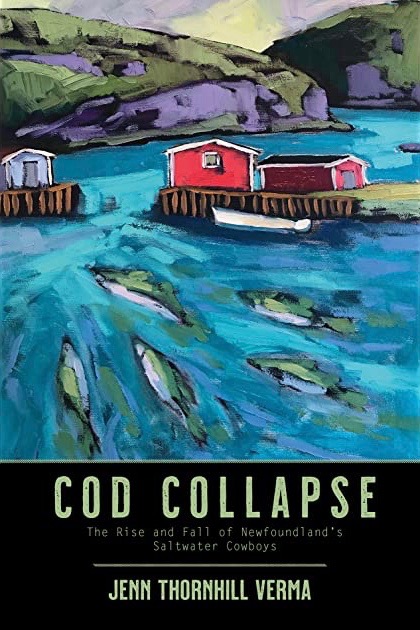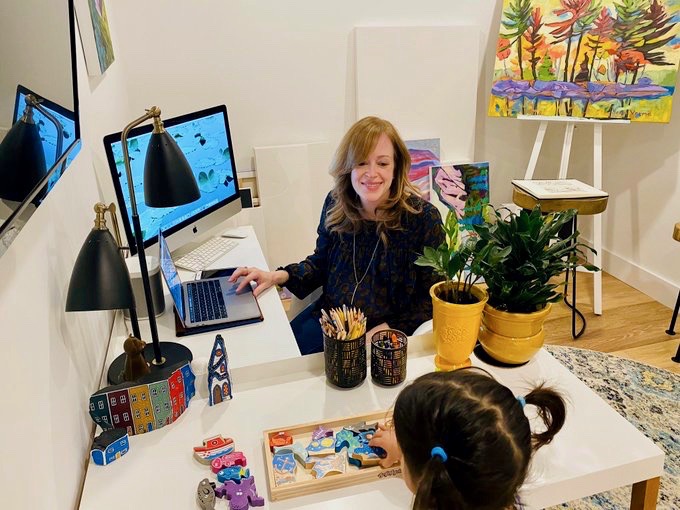Conversations in Quarantine: Jennifer Thornhill Verma

This interview is part of a series of conversations with Canadian authors about how they're coping with the pandemic, how they're writing—or not writing—and what life is like for them now.
Jennifer Thornhill Verma is the author of Cod Collapse: The Rise and Fall of Newfoundland's Saltwater Cowboys. Cod Collapse, in part, grew out of a 2018 feature she wrote for Maisonneuve, called “Letters from Pop,” which was a National Magazine Award finalist. She is currently on maternity leave from her non-profit job and is researching salmon, our food choices, and the complexity of food systems. She's also preparing to give birth to twins in Ottawa this spring.
andrea bennett: Could you describe what your life looked like before quarantine, and what it looks like now?
Jennifer Thornhill Verma: I’m a freelance journalist. I also work four days a week for a national non-profit organization. And I’m a landscape painter too, having recently launched my first solo art show. Add to that parenting a toddler, while expecting twins this spring. Before the pandemic, life was a delicate balancing act. I took early maternity leave from my non-profit job, expecting to prepare for the twins’ arrival, and spend time with my toddler, while focusing on some writing and painting projects.
Since the pandemic hit, that balancing act has been made more difficult by frequent loss of focus. Some of that is real—finding uninterrupted time for myself is a challenge even with a home office space. And some may be perceived—I am constantly questioning the importance of my work in light of the global pandemic and now, the tragic events in Nova Scotia.
ab: How have you been navigating feeling discouraged, when that feeling crops up? Do you have different ways of rooting yourself in your research (other than accidental spats with the Newfoundland and Labrador Minister of Fisheries and Land Resources)? In some ways, does your current work on salmon, and the complexities of our food systems, feel more important than ever? I've been reflecting a lot on what's essential to life and living, and access to food and shelter ranks pretty high!
JTV: As the death toll numbers rise—both those tied to the pandemic and those tied to the mass shooting in Nova Scotia—knowing each one represents a human being, it does make me question: is what I’m writing important? Does it even matter?
But I’ve always grounded myself in the principles of journalism. Until someone picks up their pen and helps make an important topic interesting and a pleasure to read, that subject matter can go forever unnoticed. I believe in the journalistic principle of raising the profile of what matters; and I believe in solutions journalism, too. We don’t have to be held to the way we’ve always done things.
The pandemic has raised the importance of food security and food sovereignty. And I think Canadians will be—and already are—questioning where their food comes from, how nutritious it is, how sustainable it is. Ditto, with what’s happened with Covid-19 outbreaks at companies like Cargill, and calls to bring in temporary foreign workers. The public is already paying more attention to our food systems and how workers are treated. Now is the time to put ideas and options on the table for future policy and practice—be it in food, housing or other supports.
I’m thirty-three weeks pregnant and this is like my version of nesting. Ha. I started Cod Collapse six months pregnant. My baby talk was usually pitching story ideas and talking about fisheries management. Looks like I’m at it again!

ab: What has it been like to be pregnant—with twins!—during the pandemic? Has it affected how and where you're planning to give birth?
JTV: I didn’t even have a chance to clean out my office at work. There were lots of things still on my list for the babies, including scoping out a bigger vehicle but that will have to wait.
Birthing is an essential healthcare service, but the pandemic has definitely changed what I thought my prenatal and birthing experience would entail. Some of my appointments are now virtual check-ins. The hospital is like a ghost town compared to pre-pandemic. Things could change a month from now but, at present, I’m told I’ll likely deliver in an operating room. If that’s the case, my husband is not allowed in the OR.
Once transferred to the mother and baby unit, we’re not allowed to leave the unit, so we’re advised to bring a cooler of extra food. If the twins need intensive care, then we’ll be restricted to one visit, one time daily. I’m ineligible for a home birth given being higher risk (and frankly, I want to be where the pain drugs are...). My husband is a super involved parent, so it’s hard to imagine that he won’t be at the birth of his children. Or that my toddler won’t be able to come visit her siblings in hospital.
And there are small things too—I can’t just feed a craving on a whim the way I did my first pregnancy. That’s small potatoes stuff, but unexpected just the same.
A year ago, my father was spending his final days in palliative care too. April 22 would have been his birthday. He died days later, on April 26, 2019. I can’t help but think of people like him, families like mine, who won’t get the opportunities we had—to be at the bedside, to see how caring the staff are, to have those final moments. So, in some ways, that’s putting things in perspective for me.I’m lucky I did most of my book promotion in the fall. I was to speak with one of my favourite authors, Linden MacIntyre, at the Ottawa Writers Fest in May, but that’s been cancelled. So too is my latest art show, which opened in March and runs until early May. Strange to think of the artwork hanging with no one to see it.
ab: Something I've been thinking about a lot is how to gently hold onto the idea of a future—or build a future—in a time when things feel so uncertain. What is currently helping you imagine the future?
JTV: I relate everything to my children now, marking my future self and life based on their ages. Like when my toddler is school-aged, I think about how I want to be able to walk her to school, work a condensed workday, and be waiting at the end of the school day to walk her home. That’s my main motivation now.I have a career—and always will—that’s mine, beyond my kids, my husband, my family. I need that too, and it could never just be a job. The work has to matter, especially when it takes me away from my family.





